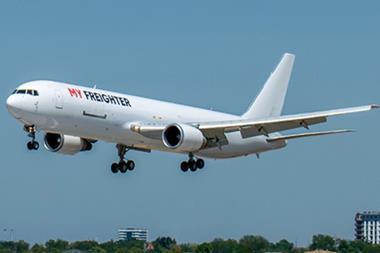American Airlines Cargo (AA Cargo) began rolling out a new end-to-end cargo management system on October 1.
Powered by the iCargo platform and implemented in partnership with IBS Software, the new tool will replace most of AA Cargo’s legacy technology, reducing the number of systems from 90 to ten. It will enable more efficient online channels, better tracking and greater efficiency in warehouses, AA Cargo said.
This step is part of a broader initiative to upgrade and modernise the business; further developments are expected to occur over the next 12 months.
Jessica Tyler, vice president strategy and development for AA Cargo, said: “As our team continues to evolve through digital enhancements and investments in technology, we want to lead the effort to challenge and change the way players in the industry interact and collaborate – that’s exciting work to be a part of.”
Tyler told Air Cargo News that the project had been almost three years in the making and involved the roll out of the system at 300 locations, with 8,000 people affected.
She added that the last 30 days had seen some challenges as the company and customers adapt to the new system.
"[The roll out] has been an incredible amount of work for everyone, but it has far exceeded our expectations," Tyler said.
"However, we aren't yet celebrating. We are still working hard to adapt to new processes and to the new systems and to say it went perfectly wouldn't be true, but it has gone well overall.
"There are challenges that we are working through with our team, with our customers, and that is where we are focussed right now - making sure we are adapting, where we need to, to the new processes and the new system."
Tyler said that over the last year the front-line team had been carrying out a "ton" of testing of the system to make sure it was ready for implementation.
"We did our best, but no matter how well that goes, and we learnt a lot during the testing cycle, there is nothing like getting 8,000 people on a system and then the realities of our business.
"What we are most proud of is the team," Tyler added. "Our team was so ready for this - we had an award-winning team that was working on 40-year-old technology.
"In this last month, the team has focussed on moving to the future and they are excited to put our 40-year-old technology to rest at some point."
Tyler said that for the time being the new and old systems are running side by side while more modules become operational.
She said one of the most exciting developments with the new system is that updates and developments can be made more easily.
Tyler said that previously, developments could be cost prohibitive because they would need to be made across so many different systems.
"But being able to streamline our technology footprint is just the beginning," she said. "It then becomes a platform for us to launch all kinds of other things that we have had to say no to for a long time."
The customer feedback has been largely positive, Tyler said: "I have heard mostly great feedback, but we have had issues and have feedback from customers about the pain they have been feeling. However, it is about how we respond to that by communicating with them and supporting them to keep their business moving."
Philip Scaria, program manager for IBS Software and lead of the modernisation effort, added: “The scale and size of the American Airlines Cargo enterprise challenged us to dig deep into our experience and skills to lead this implementation. The commitment of team members across the globe and their willingness to embrace change has made all the difference.”










